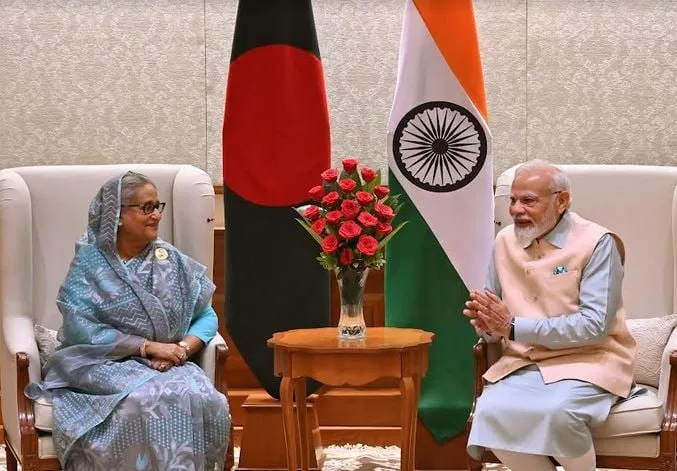
The political turmoil in Bangladesh, culminating in the unexpected exit of Prime Minister Sheikh Hasina, has left India in a state of strategic contemplation. For over 15 years, Hasina’s leadership has been pivotal in shaping Indo-Bangladeshi relations, characterized by deep economic ties and collaborative security measures. As the political landscape in Dhaka shifts, India’s response—or lack thereof—has garnered significant attention. This silence, however, is more than mere indecision; it reflects a nuanced strategy to safeguard India’s long-term interests in the region.
India’s historical ties with Bangladesh are rooted in mutual security concerns and connectivity. The northeastern insurgencies in India have long been a focal point of cooperation, with Bangladesh playing a crucial role in mitigating these threats. Additionally, connectivity projects, including infrastructure and energy links, have bolstered bilateral relations, making Bangladesh a key player in India’s regional strategy.
The sudden political upheaval in Bangladesh has caught many off guard, including India. Sheikh Hasina’s abrupt departure, reportedly orchestrated by the military amid escalating protests, has created a political vacuum that India is keenly observing. The silence from New Delhi, maintained for over 24 hours, is a calculated move to assess the rapidly changing situation and formulate an informed response.
India’s reticence can be attributed to several factors. Firstly, there is the immediate need to understand the new political dynamics in Bangladesh and their implications for bilateral relations. With Hasina making a stop in India en route to the UK, there is an added layer of complexity regarding her immediate plans and the future of the Awami League’s leadership. Indian officials have indicated that this pause is necessary to evaluate the ground reality and avoid hasty decisions that could jeopardize long-standing ties.
The ongoing parliamentary session in India also plays a role, with External Affairs Minister S. Jaishankar preparing to brief opposition parties and make a formal statement. This internal process underscores the importance of a unified and strategic approach to the developments in Dhaka. The broad consensus among Indian diplomats and analysts is that India, like the rest of the world, was unprepared for the speed of the political transition in Bangladesh.
Former Indian ambassador to Bangladesh, Deb Mukharji, and analyst Smruti S. Pattanaik highlight the unpredictable nature of Hasina’s ouster and the need for a measured response. The consensus is that while India values its historical ties with the Awami League, it must now navigate a new political landscape that includes the Bangladesh Nationalist Party (BNP) and Jamaat-e-Islami, both of which have had contentious relationships with India in the past.
The inclusion of Jamaat-e-Islami, in particular, raises red flags due to its perceived connections with Pakistan and its history of fostering extremist ideologies. India’s strategic silence, therefore, reflects a cautious approach to understanding the new power dynamics and ensuring that its national security interests are not compromised.
Despite the challenges, India’s response must align with its democratic values and support for the will of the Bangladeshi people. Observers like Shafqat Munir from the Bangladesh Centre for Terrorism Research and former Bangladeshi ambassador M Humayun Kabir emphasize that the movement leading to Hasina’s fall was driven by widespread public discontent. This people’s revolution, largely fueled by student protests, demands recognition and respect from neighboring nations, including India.
India’s long-term strategy should focus on addressing the perceptions of unequal benefits in bilateral relations. Prominent Bangladeshi voices, including Debapriya Bhattacharya, have pointed out the disparities in areas such as trade, investment, and connectivity. By addressing these concerns, India can foster a more balanced and mutually beneficial relationship with Bangladesh, ensuring that the benefits of cooperation are equitably shared.
Furthermore, India must prepare for potential challenges posed by the interim government, especially regarding the protection of minorities and maintaining law and order. Reports of violence against religious minorities and Awami League supporters highlight the fragile nature of the current political climate. India’s diplomatic engagement should emphasize the importance of protecting human rights and democratic values, aligning with the aspirations of the Bangladeshi populace.
As Bangladesh transitions to a new political era, India’s strategic silence should evolve into proactive engagement. By recognizing the legitimacy of the people’s revolution and addressing historical grievances, India can strengthen its ties with Bangladesh and ensure a stable and prosperous future for both nations. This balanced approach will not only safeguard India’s strategic interests but also uphold its commitment to democratic principles and regional stability.
In conclusion, India’s response to the political developments in Bangladesh reflects a nuanced strategy to navigate the uncertainties of a rapidly changing political landscape. By balancing strategic interests with democratic values, India can foster a resilient and equitable relationship with Bangladesh, ensuring long-term stability and cooperation in the region. As the situation in Dhaka unfolds, India’s diplomatic acumen will be crucial in shaping the future of Indo-Bangladeshi relations.
